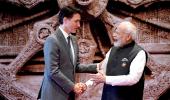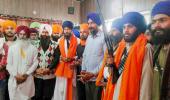'Can Trudeau's evidence hold up? If not, he's finished.'

The diplomatic skirmishes that erupted after Canada's Prime Minister Justin Trudeau alleged in the House of Commons on Monday, September 18, 2023, that India had a hand in the killing of Khalistani Tiger Force leader Hardeep Singh Nijjar -- who India designated a terrorist in 2020 -- which the Indian government has denied and dubbed absurd could get murkier believes Terry Milewski the author of Blood for Blood: Fifty Years of the Global Khalistan Project and a former journalist at the Canadian Broadcasting Corporation.
"I do not believe that Mr Modi would sit in a meeting with Trudeau making these allegations and would have sat there like a potted plant and not asked any questions. He would have been outraged," Milewski tells Prasanna D Zore/Rediff.com.
The first of a three-part interview:
How important was Hardeep Singh Nijjar was in the Khalistan movement?
I would say that he was important, but not of supreme importance. (Nijjar was) the number two within the organisation Sikhs For Justice, which is organising the referendum around the world on the independence of Khalistan.
In that capacity, he was in charge of a great many activities in Canada, but not worldwide, mainly in British Columbia, but not Canada-wide.
That job remains the exclusive property of Gurpatwant Singh Pannun (another designated Khalistani terrorist), who is a much more significant figure in the movement, which is one reason why many people are sceptical about the theory that Mr Nijjar was necessarily important enough for any foreign State to take the enormous risk of eliminating him in a targeted assassination when there were others, perhaps more valuable targets, that they might have got.
Why Nijjar, is the question. I don't think there's a good answer to that yet.
Why is the government of Canada so roiled by the murder of Nijjar, a designated terrorist wanted by India?
Why is Canada upset about it? Canada is upset about it because of the principle that no government anywhere should assassinate any Canadian on Canadian soil. That's just not how we do things.
We are not going to welcome living in a Hobbesian, dog-eat-dog world where your country can come to my country and assassinate who it will, no matter whether they are a criminal.
It's our business whether they are criminal or not and national sovereignty exists for a reason. India guards its sovereignty very carefully as does Canada.
There's a principle involved which is important, and I don't think Indians would want to dismiss that principle, and see Canadian hit squads come to India and start eliminating and executing critics of the Canadian government; it's just you wouldn't want to see that happen to you, and we don't want to see it happen to us. Isn't that perfectly reasonable?
The problem is that if India has evidence of Mr Nijjar's alleged crimes, they need to produce it. There is a long history of India asking for the removal and the arrest of (India's) enemies in Canada when they have failed to produce the hard evidence that would persuade a Canadian court to go along with it. So it's very easy to make allegations against somebody. But where's the evidence? And there has historically been a lack of evidence provided by the Indian side to support its requests.
In some cases, the evidence has been good and Canada has wrongly turned India down, in my view. Kanishka bomber Talwinder Singh Parmar is the prime example of that. His extradition was turned down and that's an example of it.
To use a similar argument, would the government of Canada have credible evidence to prove an Indian connection in the Nijjar murder?
Do you think the Canadian Security Intelligence Services (CSIS) would have given him credible evidence based on which he made the claim on the floor of the House of Commons?
I think you're absolutely correct. There is a giant hole, a giant gaping hole at the heart of the prime minister (Trudeau)'s presentation. Why is he not giving us some facts? Why is he not producing evidence?
If he does not produce evidence, in my view, he's finished, just making a fool of himself. And he's already at a very low in the (opinion) polls.
The polls suggest that if there were an election in Canada tomorrow, Trudeau would lose and the Conservative opposition leader, Mr (Pierre) Poilievre, would become prime minister.
It seems to me that Trudeau cannot go very long without revealing what it is that he thinks that he knows. And remember that if he fails to do so, let's say he goes for a week or two weeks and he throws up his hands and says, 'I can't talk about it, it's classified, I can't jeopardise the investigation.'
But, number one, the problem is that he has already jeopardised the investigation by announcing his conclusion.
He's announcing that we've decided that India is the guilty party, the Indian government the guilty party.
Number two, the other problem is that he's not the only one who knows.
Guess who else knows what he has? Narendra Modi.
Prime Minister Modi was tackled by Trudeau at the G20 in New Delhi at this very tense, very brief, frosty meeting in New Delhi, at which, according to Trudeau and his own words, 'tackled Mr Modi', in no uncertain terms.
Now, can you imagine that Mr Modi sat through that meeting like a potted plant and didn't ask any questions and just said, 'OK, that's very interesting?' Of course not!
Of course he would have asked, 'Well, how can you say this? What is your evidence? Prove it. Show me some evidence.' So he would know what, if anything, Trudeau was able to offer at that point.
Then he would have had to make a decision. When Trudeau made his public announcement in the Canadian parliament, he (Modi) would have had to make a decision. 'Now, can I (Modi) disprove it? Can I show that Trudeau's evidence doesn't add up? That it's insufficient, that it's wrong somehow, that it (Nijjar's murder) doesn't involve somebody who is an agent of the Indian government or involves somebody who we can deny; there's deniability here. It wasn't somebody who was an agent of the Indian government, but somebody who somebody knew and blah, blah, blah, blah.'
Can he (Modi), in other words, show that Trudeau is wrong? And then he would decide, 'Okay, I'm going to put out a statement saying that the allegations are absurd', which is what he (Modi) has done. So now we have a contest.
Can Trudeau's evidence hold up? If not, he's finished. Can Modi deny it? If not, he's in big trouble. I don't say he (Modi) is finished, but I think he would be in big trouble if, having said it's absurd, he can't prove it.
Would you have reasons to believe that Mr Trudeau would have shared with Mr Modi whatever evidence gathered by the Canadian Security Intelligence Services pointing fingers towards Indian agencies in the Nijjar murder?
Yes, of course, because, as I just said, I do not believe that Mr Modi would sit in a meeting with Trudeau making these allegations and would have sat there like a potted plant and not asked any questions. He would have been outraged, presumably.
He would have asked, 'What is your evidence? What are you alleging?'
There is a charge against the Canadian prime minister that he's playing to the Sikh gallery in Canada. Would Mr Trudeau be so naive so as to make such a damning allegation in the House of Commons without having solid evidence? What is your sense, what is your gut feel?
It's a good question and it's a reasonable question because people would think, well, what prime minister would possibly stick his neck out, paint himself into a corner, put his head in a noose by making these claims without having solid evidence?
And I'm not saying that it's a crazy question, but we know Trudeau in Canada, and we know, for example, and you know, too, if you cast your mind back to 2018 and his first visit to India and how that ended in a diplomatic disaster for the Canadians when it turned out they had invited to an elegant diplomatic dinner at the Canadian high commissioner's residence a convicted Khalistani terrorist by the name of Jaspal Atwal.
He was invited to dine with the prime minister and take selfies with the prime minister (Trudeau)'s wife in New Delhi, to dine with the prime minister. It was insane.
When that got out, it was a scandal. Trudeau flew home from India basically in disgrace, having been gravely embarrassed by the fact that this person (Atwal) had been in the inner councils of the Liberal Party of Canada, he was an esteemed member of the Liberal Party, and his local Liberal (Party, headed by Trudeau) member of parliament had put him on the guest list for this elegant dinner.
Well, after that, we had reason to doubt the judgment of Trudeau and his entourage and his members of parliament who should have warned him against inviting Atwal to that dinner. That's crazy to invite him, because when that gets out, it's going to be a scandal.
His judgment can be questioned. That's my point. His judgment can be questioned on the basis of that.
- Part 2 of the Interview: 'Canada Created A Khalistani Frankenstein's Monster'










